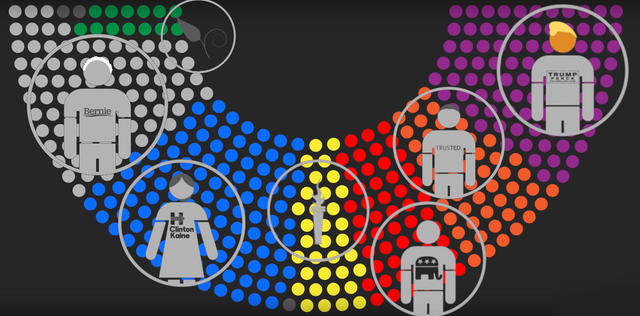The Importance Of Proportional Representation Electoral Systems
Maybe this is how the House would look like under Proportional Representation

If you live in the United States, chances are you think that having an election means you vote between multiple candidates to hold one office. And you're right, in the US, that's exactly how it works: office holders are elected based on who got the most votes, to represent a certain geographic area: From the House of Representatives, Senate, President (kind of), to mayors, school councils, etc. Some „radicals“ support Ranked Choice Voting to make elections reflect the will of the voter more. In Ranked Choice Voting, voters rank the candidates on the ballot into an order, from their favorite to the least favorite: First only the first votes are counted, the favorites. If no candidate got over 50% of the vote, then the candidate with the fewehis voters. If still nobody has a majority, the counting goes on with another elimination, and then another if needed etc, until one candidate gets over 50%. And to be fair, this really is a great way to make sure that there are no „spoiler candidates“, who only don't get elected because people are afraid the „greater evil“ is going to win if they don't vote for the second-worst evil.
But it's still not really proportional. Sure, every now and then a party that is at 5% nationally might get a district in the House of Representatives or two, but with 5% nationally, true proportionality would be 21 of the 435 seats. So how about we just make it law that makes sure each party gets exactly as many seats in the House as they got votes? This might sound radical to you, but in most democracies around the world, that is already the case, and here's how it works: For parliamentary elections there are no districts candidates run in, but parties propose a list of candidates nationally. Then on the ballot voters can choose one party, whose share of seats in parliament is then exactly as big as their share of the vote, with the candidates highest on the list getting into parliament.
With proportional representation, there is no such thing as a „spoiler party“, if half of Democrats voted for the Green Party in House elections, under proportional representation both parties combined still get just as many seats as before, but now more progressive voters are better represented in Congress through the Green Party, instead of through the corporate establishment Democrats. The same goes for Libertarians and uber-religious Neo Cons in the Republican Party: If we were to create new parties from scratch today, why would we put Libertarians into the same party as warmongering supporters of socialism for corporations?
Now, you may very well be concerned that if voters elect representatives on the national level instead of districts, that is going to eliminate the strong link between candidates and their districts. Well, we can also solve this: Don't do the list elections on the state level, but in „multiple-winner districts“ within each state, with between 3-5 winners. Those district lines are drawn similarly to how „single-winner districts“ are drawn today; we should probably throw in an independent organization to do it, but even if it was gerrymandered by the best of the legislature's abilities, that would hardly do anything if there are 5 winners in a district. That would mean the best they could do is gain one seat unfairly, but then the race would have to be so close that they might just end up losing that one seat unfairly.
For the voter, this would be basically Ranked Choice Voting, only with more winners and thus more candidates: You vote for your first choice, then for your second choice, then for your third, etc, going down as far as you like. In a 3-winner district, a candidate needs to get 33.3% to win. Let's say one gets 43.3% on the first vote, then those remainig 10% are distributed to the candidates his voters had next on the ballot, and the next candidate needs to win 33.3% to win as well, as does the third winner. As always with Ranked Choice, in situations where nobody has enough votes, the candidate with the least votes is eliminated.
This 3-5-winner electoral system is actually exactly what among others Justice Democrat Ro Khanna (D-CA) has co-sponsored in the Fair Representation Act HR3057, so if you want to know more about it you can go here https://www.fairvote.org/fair_rep_in_congress#why_we_need_the_fair_representation_act
Please tell me what you think about proportional representation, especially if you're an American, I'm looking forward to an entertaining discussion